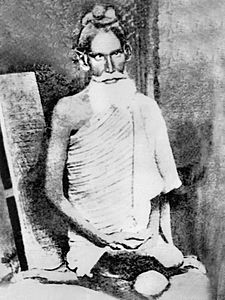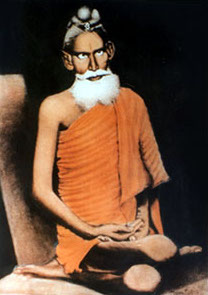Lokenath Brahmachari facts for kids
Quick facts for kids Baba Lokenath |
|
|---|---|

A rare camera photograph of Sri Sri Lokenath Brahmachari
|
|
| Birth Date | 6 August 1730 Kachua, North 24 pgs, Barasat, Bengal Subah |
| Died on | 1 June 1890 (aged 160) Baradi (near Dacca), Bengal Presidency |
| Guru/teacher | Bhagwan Ganguly |
| Philosophy |
|
Baba Lokenath Brahmachari was a very special spiritual teacher and yogi (someone who practices yoga) from Bengal. Many people consider him one of the most important teachers of eastern wisdom. He lived a very long life and taught people about peace and self-discovery.
Contents
Early Life of Lokenath
Baba Lokenath was born as Lokenath Ghoshal in a place called Chaurasi Chakla (which is now in West Bengal) in 1730. He was born on Janmashtami day, which is the birthday of Lord Krishna. His family was Bengali Brahmin, and his parents were Ramnarayan Ghoshal and Kamaladevi. He was their fourth child.
Back then, it was common for parents to promise one of their sons to become a sannyasi (a person who gives up worldly life for spiritual goals). When Lokenath was 10 years old, his father asked Pandit Bhagavan Ganguly, a local yogi, to be Lokenath's teacher. Bhagavan Ganguly quickly saw how special young Lokenath was and agreed to teach him. Lokenath left his home and began his spiritual journey with Bhagavan Ganguly. His friend, Benimadhav, also joined them.
His Spiritual Journey
For the next thirty years, Baba Lokenath trained very hard in different types of Yoga. He traveled to many faraway places across the Indian subcontinent. He chose a very simple life, promising to remain celibate (meaning he would not marry or have a family), which is why he was called brahmachari. He also fasted for long periods.
He finally reached Enlightenment (a state of deep spiritual understanding) in the Himalayas in 1820, when he was 90 years old. His teacher was still alive at 150 years old! After becoming enlightened, he is said to have traveled all over South Asia and Southeast Asia on foot. He visited many holy places of different religions like Islam, Christianity, Judaism, Buddhism, Sikhism, and Jainism. This included three trips to Mecca and visits to places like Afghanistan, Iran, Israel, Palestine, and other parts of the Middle East.
Return to Bengal
Baba Lokenath came back to Bengal in 1866. He settled in Baradi, which is near Dhaka (in present-day Bangladesh). There, he built a small hut out of mud and bamboo with his own hands. This hut later became his ashram (a spiritual retreat) where he lived for the rest of his life. The land for the ashram was given to him by Dengu Karmakar, a person Baba had helped in the past.
Unlike many other sages (wise people) and mystics of his time, Baba Lokenath preferred to live quietly and avoided being famous. However, he would help and heal anyone who came to him, no matter their caste, religion, or background. His fame naturally spread far and wide, and the ashram in Baradi slowly started to attract followers from all over the world.
Amazing Stories and Legends
Not much is known about Baba Lokenath's personal life, and it has always been a bit of a mystery. Many folklores (traditional stories) tell about his amazing powers and magical abilities. People say he lived to be 160 years old, making him one of the most famous examples of human longevity myth (stories about people living for a very long time).
Years of sadhana (spiritual practice) in the high Himalayas gave him the ability to handle extremely cold temperatures without needing warm clothes. In his later years, it is also said that he stopped sleeping completely and would not even blink. Because he never turned anyone away, he was also known as the Wish tree, meaning he helped fulfill people's wishes.
His Passing and Legacy
Baba Lokenath went into a deep meditative state called samadhi with his eyes open on June 1, 1890. This was on the 19th day of Joishtho in the Bengali calendar (1297 BS). He was surrounded by his students at his Baradi Ashram.
Before he passed away, he comforted his sad followers. Baba promised that he would continue to be there for anyone who prayed and asked for help, even after his death, and forever. One of his famous sayings, roughly translated, is: "Whether it is at war, or in the woods, or on the water; if you are ever in danger, remember me, and I shall save you." In Bengali, this is: "রণে বনে জলে জঙ্গলে, যখনই যেখানে বিপদে পড়িবে, আমাকে স্মরণ করিবে আমি তোমাদের রক্ষা করিব।"
More than a century after his death, Baba Lokenath is still a highly respected spiritual figure in India and around the world.
Images for kids
 | Isaac Myers |
 | D. Hamilton Jackson |
 | A. Philip Randolph |




